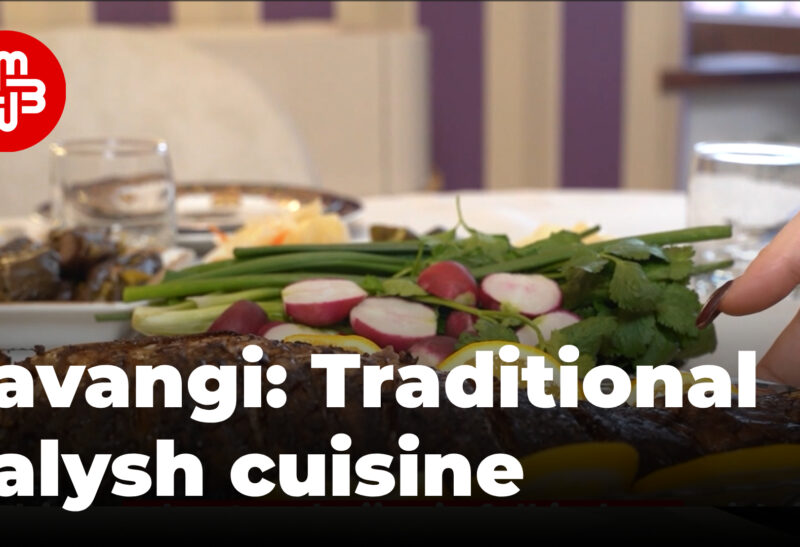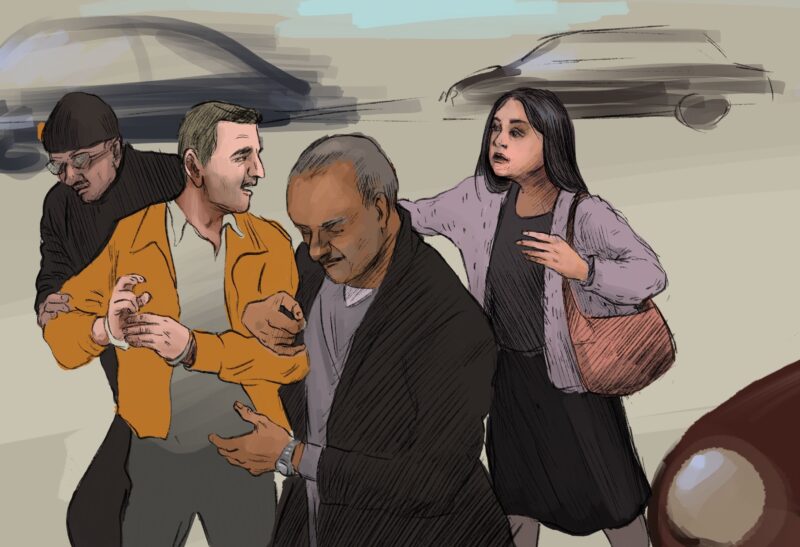LGBT+ persons in Azerbaijan have always faced various forms of persecution and pressure. During the mass raids of 2017, at least 200 people were arrested. Upon release, they reported torture and humiliating treatment by the police.
The pressure on the LGBT+ community continues to this day. According to the International Lesbian, Gay, Bisexual, Trans, and Intersex Association (ILGA), for several years, including 2021, Azerbaijan has been in last place among the 49 countries of Europe in respecting the rights of LGBT+ people.
But trans people face persecution perhaps more than anyone else. They are attacked, and sometimes even murdered. The most recent incident occurred in August 2021, when a trans woman named Nuray was tied up and burned to death in the Garadagh region of Baku.
Before her murder, Nuray had received attention for a video taken at her friend’s birthday party in which she wore a wedding dress.
Most trans people in Azerbaijan make a living in sex work; many point out they simply can’t get any other job.
27-year-old Loren is one of the few who has been able to make a living in another field. She lives in the city of Sumgayit and works as a stylist at a beauty salon. But her road to success and, as Loren herself says, to the life of her dreams, was long and difficult.
They told me to leave school.
Loren was born in a small village of 28 houses in the region of Shabran and lived there until the eighth grade. Then she continued her education in Baku and later moved to the neighboring city of Sumgayit.
Loren recalls that when she moved to Baku to study, she encountered discrimination and insults.
“I was told to leave school. Yeah… The principal told the vice principal, who told my homeroom teacher that I shouldn’t be there, that I acted like a girl and I was a bad influence on the other kids. Although in the whole school no one else came out as trans except me,” Loren says with a sad smile. “I was literally kicked out of school for being trans.”
The attitudes of her classmates varied. Some of them supported her and said that it was her private business, but more often than not she faced insults and humiliation.
Loren says that she was convinced of her gender identity at a young age, and unlike the vast majority of Azerbaijani families, Loren’s family supported her.
“I remember when I was five or six I often held my stomach and prayed to God to become a mother,” says Loren. “My parents saw it, too, but probably disregarded it because I was a child and didn’t react at all. But since they watched me grow up and develop that way, not only my family but even our neighbors and acquaintances had time to get accustomed to it.”
Loren happily points out that her father stays in touch, takes an interest in her life, helps when times are tough, and accepts her as she is.
“Judge for yourself: if he didn’t accept me he wouldn’t care where I was or what I was doing,” explains Loren. “I mean, he does his duty as a parent but he doesn’t interfere. Of course, he thinks of me as the child who he knew and who he was used to. He knows about the change in my appearance and accepts me that way, otherwise he wouldn’t call or look for me, although he doesn’t like to draw attention to it.”
Even that kind of support is very unusual for Azerbaijan’s conservative society and, understanding that perfectly well, Loren is truly grateful to her parents for not turning their backs on her.
“If they had turned their backs on me, I would have thought, ‘well, if nobody cares about me, then I’ll do whatever I have to to live'”, she says.
Not everyone is cut out to fight.
In Azerbaijan trans women are usually engaged in sex work, for which Loren blames society and especially parents.
“People who do sex work have been rejected by society,” believes Loren. “And parents often think, ‘let them live how they want, just far from me.’ But it shouldn’t be like that. Many trans people have it really tough right now. Not everyone is cut out to fight. Not everyone can grit their teeth and go hungry for a day, or five or ten. Not everyone gets a chance, unfortunately. I know parents who were actually prepared to kill their children because they were trans or LGBTI+.”
Loren is certain that it was the support she received from her loved ones that helped her stand strong and continue to live.
“However much others support you,” says Loren, “if the closest people in your life have turned their backs on you—your dad, mom, brothers, and sisters—it’s just not the same.”
I could only get jobs from people who wanted to sleep with me.
Five years ago, Loren bought an apartment in Sumgayit and thanks God that she bought it “with honestly earned money.”
At first, Loren wanted to attend an art university, but her father wouldn’t allow it. Now she’s a stylist, doing a job that she loves, but early on she had to overcome a host of obstacles.
“Very few people would give me a job,” says Loren recalling those days, “only people who wanted something from me… I mean, in a sexual way… they wanted to sleep with me. I took the job, and then after a while they’d say ‘let’s sleep together.’”
According to Loren, beauty salons are one of the few places where LGBT+ people can find themselves a job. But even in this field, as in every other, they may face discrimination and pressure.
Loren says that she tried to work at two salons.
“I had my own salon, but it was forcibly closed because I’m trans. They told me that we’re problematic people and that I would cause them problems. Then they informed a local cop and he started to put pressure on me”, she says.
The owner of the property that Loren rented for her salon was forced to evict her because they intimidated him, too. “His son worked in the police and they threatened him that if he didn’t close the salon they would fire his son, so I left”, she explains.
Loren declined to say who exactly threatened her, adding that an investigation is ongoing.
“Then I got a job at another salon,” she continues, “but the police were surveilling me. They would stand in front of the salon until I left work, and then they would leave, too. I left home, went to work, left work, and the whole time they would follow me. They caused problems for me and I was fired.”
Loren tried her luck a third time and applied at yet another salon.
“When I applied for the job, I didn’t say anything to the manager,” recalls Loren, “but when I did tell her, she said: ‘So what? I don’t care about your orientation or identity, I care about your professionalism.’ She is one of the people who made it possible for me to have a job and make some money. She supports me in a lot of ways, as a person and as an employee.”
The staff and the clients treat Loren well, but even here she isn’t ready to open up to everyone.
“It’s hard to tell people how people will react, and a lot of them treat me negatively,” says Loren. “They don’t think that I want to work and earn an honest living, too. If I didn’t have this job, who knows where I’d be right now.”
Produced with the support of the Russian Language News Exchange



